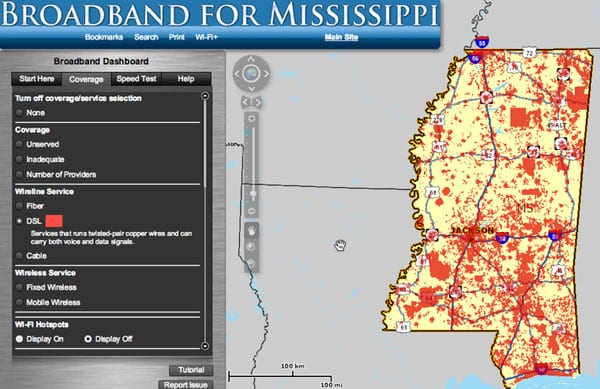
March 11, 2019; Mississippi Center for Public Policy
The Taxpayers Protection Alliance (TPA) foundation, a nonprofit funded by several Koch-supported organizations and the telecom industry, warns of the dangers of using bonds to fund Mississippi’s new Broadband Enabling Act.
On January 30, 2019, the Mississippi Broadband Enabling Act was signed into law by Gov. Phil Bryant. It passed the House with all but three votes and passed the Senate unanimously. The legislation is meant to address the lack of access to high-speed broadband internet in almost all the rural parts of the state. “It allows the state’s 25 electric cooperatives to offer rural broadband internet to their customers. Those cooperatives, all under the umbrella of the Electric Cooperatives of Mississippi organization, serve about 1.8 million Mississippians,” according to the Jackson Free Press. A 2018 study found that Mississippi ranks 49th among US states in internet coverage, ahead of only Montana.
In December, the US Department of Agriculture launched a broadband infrastructure program to provide $600 million in loans and grants to rural areas. These loans and grants are essential to the funding of the Broadband Enabling Act because the law has no funding from the State of Mississippi. A lawmaker from Natchez, Rep. Robert Johnson III, voiced support for using public financing for the project while electrical cooperatives are applying for federal broadband infrastructure grants. Johnson floated the bond proposition as a means to accelerate construction.
The TPA purports to protect taxpayers, claims to be nonpartisan, and asserts that they are dedicated to “educating the public through the research, analysis, and dissemination of information on the government’s effects on the economy.” On the face, the TPA’s mission is that of a nonprofit working for the public good. However, it takes very little research to discover that the overwhelming majority of the organization’s income stream and messaging comes from industry.
Sign up for our free newsletters
Subscribe to NPQ's newsletters to have our top stories delivered directly to your inbox.
By signing up, you agree to our privacy policy and terms of use, and to receive messages from NPQ and our partners.
TPA has received ongoing funding from the Internet and Television Association and the Wireless Association (which also supports the Mercatus Center, which supplied the TPA’s expert article). Freelance journalist Jay Cassano writes on Medium that TPA “has a recent history of being a conduit for the telecom industry’s positions to the general public.” According to Pew Research Center, text originating on TPA’s website accounted for “the most popular anti-net neutrality comment submitted to the FCC.” Americans for Job Security, a Koch-backed organization, gave $1.1 million to TPA in 2011 according to tax filings.
Johnny Kampis of TPA holds Kentucky Wired up as a bond bogeyman and a cautionary tale for Mississippi. Kentucky Wired is the statewide, open-access broadband network overseen by the Kentucky Communications Network Authority. Unlike the Mississippi initiative that empowers electrical cooperatives to provide broadband access, the Kentucky Communications Network Authority is, according to its website, “the public technology authority that partners to build and manage a Commonwealth-owned, leading-edge communication infrastructure service to provide affordable broadband connectivity, foster collaboration, and promote innovative use of digital technologies connecting the people of Kentucky to the world.”
While the program has strong support, it faces numerous challenges, from being $100 million over budget and behind schedule to an inability to secure right-of-way. Kentucky State Auditor Mike Harmon has lambasted the program, saying it places too much financial risk on taxpayers and established unrealistic timelines for completion of the project. Portions of the financing package are dependent on revenues derived from an operational Kentucky Wired that may further add to the programs short-term financial woes.
Extending broadband to reach rural residents can be challenging, as the population served is far more dispersed than in denser urban areas. This challenge is made more difficult by voices that do not speak with transparency and openness. The use of a nonprofit for deceptive purposes may not be illegal, but it is undoubtedly testing the moral and ethical bounds. Front nonprofits such as the TPA are seen by their funders simply as tools to advance business interests, or a means to influence legislation and regulations. They latch onto the goodwill, good work, and good deeds of others to gain an advantage to which they are not entitled.—Skip Lockwood











